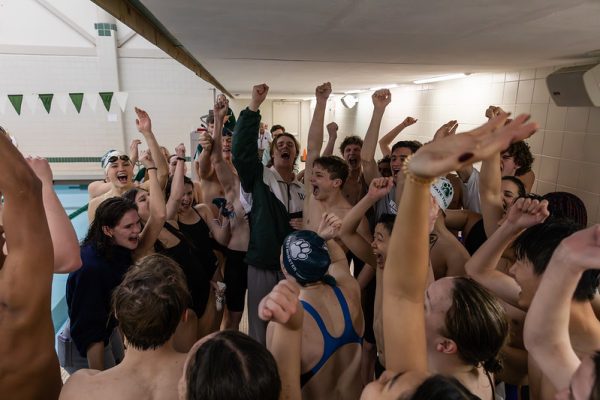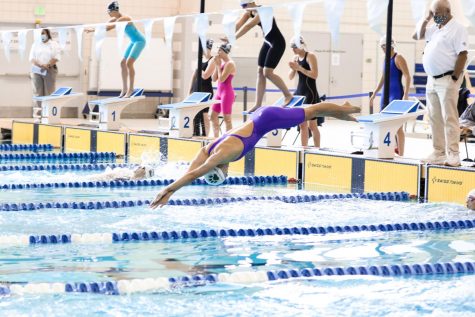Swimmers kick off season with Midnight Madness
As fall sports wind to a close, one of Westminster’s best athletic programs is undergoing the start to their season: the swim team. With a long season ahead of them, the SwimCats have begun to draw up their goals for the upcoming season and continue to develop their unique traditions and training that have made them so successful.
The Westminster swim team is one of the school’s most successful athletic programs, grossing 42 state championships in nearly 50 years. As a result, the most prominent goal for the swim team this year is to come out victorious from the state championship at the end of the swim year. While there are many objectives during the season, most swimmers would be hard pressed to find a feeling sweeter and more rewarding than taking home the championship trophy.
“Obviously, the main goal for the team is winning state and getting that ring,” said sophomore Jack Stone. “To do this, we definitely need to work really hard in practice in order to achieve our full potential.”
Even though the swim team has had great success at the state level, many swimmers feel that they can certainly still continue to improve from last year’s performance. Senior Zack Saffran believes that one area the team could better from last year is attitude during practice. Although Saffran knows that practice should be fun, he also believes that it is one of the most important factors in facilitating the progress of the team’s overall performance.
“I want the team to work harder in practices,” said Saffran. “Usually, people goof around, which can be fun, but it’s more fun when we focus in practice because then we are able to see our improvement.”
In addition to its unique ability to consistently be successful, the swim team also has special team traditions, most notably the event called “Midnight Madness.” The Midnight Madness tradition consists of all the swimmers first arriving to the pool and listening to a speech from their coaches and captains about the upcoming season. Following, all the swimmers hold hands around the pool, and exactly at midnight, the entire team jumps into the pool together. The team ends the night by going home with a senior to continue this fun-filled tradition at his or her house. In essence, Midnight Madness serves as a way for the team to bond closer in strong unity.
“The belief for Midnight Madness is essentially ‘first in the pool, first in state’,” said Saffran. “The tradition really serves as a bonding night for the whole team, and I’d say that it definitely brings the team together.”
Through traditions like these, the team enables swimmers to extend their friendships to different social circles at Westminster. Practices can usually last hours, allowing many of the members of the team get to know each other extremely well. As a result, the swim team creates lasting friendships that survive throughout high school.
“In the beginning of the season, I really put myself out there and created lots of new friendships with many of the upperclassmen,” said Stone. “In most cases, I never would have had the opportunity to become friends with them, so in this way I feel that the team really helped to expand my social circle.”
Many have wondered how Westminster swimming has continually had so much success. Swimming head coach Pete Higgins attributes it to the team’s unique style of training. He believes that one of the most effective ways to improve speed in the pool is to not focus so much on the actual stroke as to dedicating more time to practicing actions, such as the leap off the starting block and the flip turn.
“Virtually, every school in the country bases their team’s success on how many yards you’ve swam,” said Higgins. “In reality, however, it’s less about how much distance you’ve covered and more about what kind of distance you’ve covered. So our first two weeks this year, we worked on nothing but legs to try and hone in our fastest modes of transportation, which is the initial start and the flip turn, not the actual stroke in the pool.”
Higgins also accredits part of his team’s success to his observational skills and ability to study swimmers. During the 1996 Olympics, Higgins noticed that the world record-holding swimmer, Alexander Popov, was unconventionally keeping his head completely below the surface. Realizing that this method helps reduce body drag by aligning the body in a more horizontal position, Higgins had his entire team swim with heads below the surface, noticing a significant drop in the team’s cumulative average time by over three seconds.
Although Higgins and the team know that winning state is rewarding, improving as swimmers as well as people proves to be more important.
“It’s not really about what your time [in the pool] is,” said Higgins. “It’s about what kind of person you become. At the end of the day, who cares if you can go 46 seconds in the 100-yard freestyle? What kind of person are you in and outside the pool? What’s your value system? In my opinion, your character is a whole lot more important than your speed as an athlete.”






